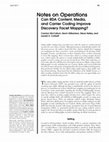Papers by Lauren E Corbett

Library Resources & Technical Services, 2006
The topic of electronic journals (e-journals) dominated the serials literature from 2000 to 2003.... more The topic of electronic journals (e-journals) dominated the serials literature from 2000 to 2003. This review is limited to the events and issues within the broad topics of cost, management, and archiving. Coverage of cost includes such initiatives as PEAK, JACC, BioMed Central, SPARC, open access, the "Big Deal," and "going e-only." Librarians combated the continued price increase trend for journals, fueled in part by publisher mergers, with the economies found with bundled packages and consortial subscriptions. Serials management topics" include usage statistics; core title lists; staffing needs; the "A-Z list" and other services from such companies as. Serials Solutions; "deep linking"; link resolvers such as SFX; development of standards or guidelines, such as COUNTER and ERMI; tracking of license terms; vendor mergers; and the demise of integrated library systems and a subscription agent's bankruptcy. Librarians archived print vo...
Technical Services Quarterly

Library Resources & Technical Services, May 11, 2017
Online public catalogs have provided users with the option to conduct faceted searches for more t... more Online public catalogs have provided users with the option to conduct faceted searches for more than a decade. Although faceting is undoubtedly useful to the discovery process, the authors found that their system's default facet mapping was inadequate for their researchers' needs, particularly for the faceting of bibliographic formats, and librarians at their institution have worked extensively to revise this mapping. These revisions have relied on creating complex decision trees, which require the system to consult multiple fields and subfields in bibliographic records to assign more precise format facets. When their authority control vendor offered to add Resource Description and Access (RDA) coding to their bibliographic records, including the new Content, Media, and Carrier fields that describe formats with greater granularity than the General Material Designation, they questioned whether the new RDA coding might improve their public catalog's format faceting. They found that the limitations of the MARC format as a data encoding standard meant that the RDA coding was not appreciably more useful to the format faceting process. T he online public catalog interface of the Z. Smith Reynolds Library at Wake Forest University (WFU) has provided users with the option of faceted searching since 2009. Although faceting is undoubtedly useful to the discovery process, we found that our system's default facet mapping was inadequate for our researchers' needs, particularly regarding the faceting of bibliographic formats, and our librarians have worked extensively to revise this mapping. These revisions have relied on creating complex decision trees, which require the system to consult multiple fields and subfields in bibliographic records, to assign more precise format facets. When our authority control vendor, Backstage Library Works, offered to add Resource Description and Access (RDA) coding to our bibliographic records, including the new Content, Media, and Carrier Type (CMC) fields that describe formats with greater granularity than the General Material Designation (GMD), we questioned whether the new coding could be used to improve the format faceting in our public catalog. With this research question in mind, we sent our bibliographic records to Backstage for RDA enrichment. Setting Located in Winston-Salem, North Carolina, WFU is a private institution with approximately 4,800 undergraduate and 2,800 graduate students. Three libraries-a medical library, a law and professional library, and the Z. Smith Reynolds Library (ZSR)-support the university's academic activities. ZSR, the largest of the three libraries, serves both undergraduate and graduate students in WFU's
Technicalities, 2021
Do you find that a crisis can bring things into sharp focus but that later things get fuzzier aga... more Do you find that a crisis can bring things into sharp focus but that later things get fuzzier again? You will be reading this more than a year after the COVID-19 pandemic started in the United States, but I began writing it at exactly the six-month mark, in mid-September 2020. This is a record of action from March 2020 to April 2021 in collection management and technical services (Resource Services) at my institution’s main library.
Technicalities, 2019
When employees do their jobs with more current and advanced knowledge and have the support of a n... more When employees do their jobs with more current and advanced knowledge and have the support of a network to get answers that cannot be found within the place of employment, it contributes to their success and makes the organization more successful. When employees know that they are bringing value to the organization, it generates confidence and satisfaction, which also has positive impact on the employee and organization.
Technicalities, 2018
What is the value of the work done in library technical services to researchers, to librarians, t... more What is the value of the work done in library technical services to researchers, to librarians, to someone using Google? To me, it seems relatively straightfor- ward to help people at the university understand that someone must order, pay for, and make collections avail- able for use. But I also would like to make it clear to people everywhere that there is value added for a larger, even worldwide, community of information- seekers when copy catalogers and cataloging librarians in any library create bibliographic records, make data corrections, or add missing bits of data.
Technical Services Quarterly
Workplace Culture in Academic Libraries, 2013
Library Resources & Technical Services, 2017
Technicalities, 2016
Is it safe to say that everyone using the Internet uses Google? How many of us, who are in the bu... more Is it safe to say that everyone using the Internet uses Google? How many of us, who are in the business of making intellectual content findable, search something using Google on a daily basis? This, along with everything I read and hear, gives me a sense of urgency about the work to be done before researchers will find more academic content through Google.
Cory Tucker is Head of Collection Management at the University of Nevada Las Vegas (UNLV) Librari... more Cory Tucker is Head of Collection Management at the University of Nevada Las Vegas (UNLV) Libraries. Cory is responsible for administration and coordination of collection development activities for the University Libraries and leads the identification, evaluation, selection, and initial licensing of print and electronic information resources for the UNLV Libraries. In addition, Cory coordinates and implements the collection assessment activities for the Libraries. Cory is an active member of ALCTS and is currently the Chair-Elect of the Collection Management Section. Cory received his undergraduate degree in finance from the University of Tennessee-Knoxville and received his MLS from the University of South Florida.
The Z. Smith Reynolds Library at Wake Forest University was the recipient of the 2011 Excellence ... more The Z. Smith Reynolds Library at Wake Forest University was the recipient of the 2011 Excellence in Academic Libraries Award from the Association of College and Research Libraries (ACRL). The ACRL award committee noted how the mission and programming of the library effectively matched the institution's goals. This resulted from leadership that encouraged creativity, autonomy, experimentation, and unified the organization to help faculty, students, and staff succeed.
[Chapter in] Workplace Culture in Academic Libraries: The Early 21st Century , 2013

Library resources & technical services, Jan 2006
https://www.ala.org/alcts/files/resources/lrts/archive/50n1.pdf
The topic of electronic journals... more https://www.ala.org/alcts/files/resources/lrts/archive/50n1.pdf
The topic of electronic journals (e-journals) dominated the serials literature from 2000 to 2003. This review is limited to the events and issues within the broad topics of cost, management, and archiving. Coverage of cost includes such initiatives as PEAK, JACC, BioMed Central, SPARC, open access, the “Big Deal,” and “going e-only.” Librarians combated the continued price increase trend for journals, fueled in part by publisher mergers, with the economies found with bundled packages and consortial subscriptions. Serials management topics include usage statistics; core title lists; staffing needs; the “A–Z list” and other services from such companies as Serials Solutions; “deep linking”; link resolvers such as SFX; development of standards or guidelines, such as COUNTER and ERMI; tracking of license terms; vendor mergers; and the demise of integrated library systems and a subscription agent’s bankruptcy. Librarians archived print volumes in storage facilities due to space shortages. Librarians and publishers struggled with electronic archiving concepts, discussing questions of who, where, and how. Projects such as LOCKSS tested potential solutions, but missing online content due to the Tasini court case and retractions posed more archiving difficulties. The serials literature captured much of the upheaval resulting from the rapid pace of changes, many linked to the advent of e-journals.
Charleston Conference Proceedings 2004, 2006
Voice III: Mrs. MyTee Big Donor (phone) ILauren Corbett] Voice IV: Helen, fellow librarian (off-s... more Voice III: Mrs. MyTee Big Donor (phone) ILauren Corbett] Voice IV: Helen, fellow librarian (off-stage)[Stefanie Dubose] Voice V: Geeky Gagline. systems librarian (phone)[Lauren Corbett] Voice VI: Madame Director (AM) ILauren Corbett] Silkx Setiryals walks into her ...
Library Collections, Acquisitions and Technical …, 1999
Conference Presentations by Lauren E Corbett











Uploads
Papers by Lauren E Corbett
The topic of electronic journals (e-journals) dominated the serials literature from 2000 to 2003. This review is limited to the events and issues within the broad topics of cost, management, and archiving. Coverage of cost includes such initiatives as PEAK, JACC, BioMed Central, SPARC, open access, the “Big Deal,” and “going e-only.” Librarians combated the continued price increase trend for journals, fueled in part by publisher mergers, with the economies found with bundled packages and consortial subscriptions. Serials management topics include usage statistics; core title lists; staffing needs; the “A–Z list” and other services from such companies as Serials Solutions; “deep linking”; link resolvers such as SFX; development of standards or guidelines, such as COUNTER and ERMI; tracking of license terms; vendor mergers; and the demise of integrated library systems and a subscription agent’s bankruptcy. Librarians archived print volumes in storage facilities due to space shortages. Librarians and publishers struggled with electronic archiving concepts, discussing questions of who, where, and how. Projects such as LOCKSS tested potential solutions, but missing online content due to the Tasini court case and retractions posed more archiving difficulties. The serials literature captured much of the upheaval resulting from the rapid pace of changes, many linked to the advent of e-journals.
Conference Presentations by Lauren E Corbett
The topic of electronic journals (e-journals) dominated the serials literature from 2000 to 2003. This review is limited to the events and issues within the broad topics of cost, management, and archiving. Coverage of cost includes such initiatives as PEAK, JACC, BioMed Central, SPARC, open access, the “Big Deal,” and “going e-only.” Librarians combated the continued price increase trend for journals, fueled in part by publisher mergers, with the economies found with bundled packages and consortial subscriptions. Serials management topics include usage statistics; core title lists; staffing needs; the “A–Z list” and other services from such companies as Serials Solutions; “deep linking”; link resolvers such as SFX; development of standards or guidelines, such as COUNTER and ERMI; tracking of license terms; vendor mergers; and the demise of integrated library systems and a subscription agent’s bankruptcy. Librarians archived print volumes in storage facilities due to space shortages. Librarians and publishers struggled with electronic archiving concepts, discussing questions of who, where, and how. Projects such as LOCKSS tested potential solutions, but missing online content due to the Tasini court case and retractions posed more archiving difficulties. The serials literature captured much of the upheaval resulting from the rapid pace of changes, many linked to the advent of e-journals.